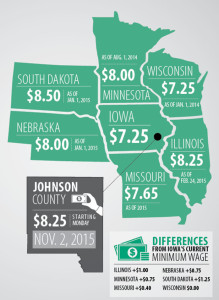Johnson County officials weigh in on minimum wage decisions.
By Austin Petroski
Starting next week, employees in Johnson County will get paid a little more.
On Nov. 2 minimum wage in Iowa City, Coralville, and North Liberty will increase to $8.20 an hour. This comes after the Johnson County Board of Supervisors voted in September to raise the minimum wage in three stages, culminating in $10.10 per hour in 2017.
The ordinance allowed for municipalities to accept or opt out of the wage increase. Iowa City, Coralville, and North Liberty have all decided to let the increase happen. Solon and Swisher both voted against implementing the ordinance.
Iowa City City Councilor Jim Throgmorton said the city is looking to collect data about the potential wage increase. He said the council has received some negative feedback regarding the proposed increase.
Coralville Mayor John Lundell said he agreed data should be compiled in order to better understand how the increase will effect county employees. Lundell said he has heard very little feedback from the Coralville community regarding the proposed increase.
Swisher Mayor Christopher Taylor said he has not received any feedback after Swisher’s City Council decided to opt out of the proposed change.
“We had a number of Swisher residents speak in support of maintaining our minimum wage at the state level,” he said in an email.
Taylor also said the majority of working residents in Swisher work in Linn County, not Johnson County.
Wisconsin is the only state bordering Iowa with a minimum wage similar to Iowa’s $7.25. Other states in the Midwest, including Minnesota, Missouri, Nebraska and Illinois, all have minimum wages hovering around $8.
However, the eventual raise for Johnson County to $10.10 in 2017 would follow similar changes in other areas of the U.S. Seattle has an $11 minimum wage, to be raised to $15 by 2019. San Francisco raised its minimum wage to $12.25 in May, and the state of California has a $9 minimum wage.
Karl Kramer, campaign co-director of the San Francisco Living Wage Coalition, said the wage increase has helped working families in the city.
“In our observations, it had a lot to deal with why the recession didn’t hit as badly here as other areas,” he said.
Kramer also said the increase helped small businesses in the area. This is something that has been an issue with the Johnson County wage increase.
“When workers have more dollars to spend, they spent it at the mom-and-pop-type places,” he said.
Kramer said informing the public about the wage increase played a large part in building support for it. He also said non-profits were eventually affected positively by the wage increase.
“Initially, they had opposed, but they learned from experience,” Kramer said. “They were able to reduce turnover and provide a much better service.”



